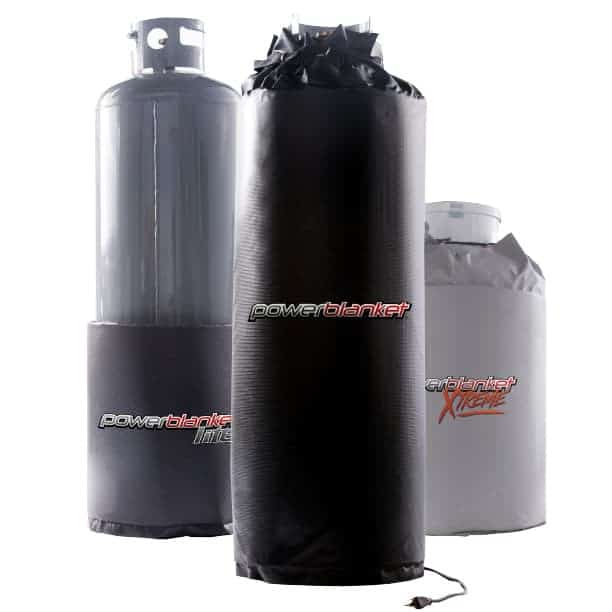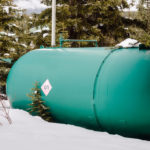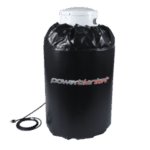Propane is one of the most convenient and essential fuels in our homes and industry. We use it to fire up backyard barbeques, power forklifts, and provide heat and hot water. It’s a non-toxic gas that won’t pollute aquifers or soil.
Portable propane tanks are handy and environmentally friendly because the tanks last up to 40 years with proper maintenance and inspection. But do you know how to store and transport the tanks properly?
Although the National Fire Protection Association (NFPA) does not list propane as a leading cause of fires, pressurized propane can create an explosion hazard if not stored or handled correctly.
This article will cover how and where to store propane tanks safely.
Propane tank heaters from Powerblanket are the safest and most effective way to prevent freeze events and keep your propane flowing properly in cold weather conditions, no matter the external temperature. The lightweight and durable blankets wrap around the tank and warm from edge to edge with even heating across all surfaces of the tank.
What Is a Propane Storage Tank?
BBQ propane tanks start as a sheet of rolled steel. The steel gets cut into round discs and then formed into cylindrical shells. The two halves get welded together to form a tank. A brass valve and stem screw into the top to complete the tank. Most tanks will have a baked-on powder coating to protect the steel from corrosion. You can watch the manufacturing process here.
Sizes of reusable propane storage tanks start at the grill tank size. It weighs about 17 pounds (8 kg.) when empty, and it holds 20 pounds (9 kg.) of propane when full. Propane tanks come in 60-, 100-, 120-, 250-, 500-, and 1,000-gallon sizes for home or industrial purposes.
Some manufacturers use gallons and pounds interchangeably when referring to tank size, but that isn’t very clear. Although tanks can be measured by gallons, vendors sell propane by weight.
How Many Gallons of Propane In a 100-Pound Propane Tank?
When compressed, propane turns into a liquid. The density of the liquid fluctuates with temperature. For example, a gallon of propane weighs 4.05 pounds at 90°F (32.2°C) but 4.20 pounds at 60°F (15.5°C). This fluctuation is why manufacturers will only fill a tank to 80% of its capacity. For a 100 lb tank, they will only fill it to 80 pounds.
Using the median weight of propane at 4.11 lb. per gallon (measured at 77°F), we use this formula:
- Propane Gallons = Weight Of Propane / Propane Density
- Propane Gallons = 80 lb / 4.11 lb/gallon = 19.46 Gallons
So, a 100 lb tank holds 19.46 gallons of propane. However, you pay for 80 pounds, not gallons, because they fill it on a scale.
For an in-depth explanation of weights and measures of propane, go to our blog, “How Many Gallons of Propane in a 100-Pound Tank?”
How to Safely Store and Transport a Propane Tank
Whenever transporting propane cylinders, they must be in the tank upright position and tied securely to prevent movement during transport. The Department of Transportation regulates the transportation of full and empty portable gas cylinders. Here are their limits:
- Amount for closed automobiles: You can transport up to four propane tanks in an enclosed vehicle.
- Propane weight: There is a 90-pound propane weight limit for enclosed vehicles.
- Cylinder weight: Each cylinder in an enclosed vehicle must have no more than 45-pounds of gas.
- Propane tank sizes: The tank sizes can vary, but the total propane weight must not exceed 90 pounds.
- The amount for open trailers and trucks: Open trucks or exposed trailers can carry a maximum combined propane weight of 1,000 pounds.
Once you receive a new tank, you need to store it properly for safety and efficiency.
Where Should Propane Tanks be Stored?
Some frequently asked questions people have regarding storage are:
Where do you store propane tanks at home?
Place tanks in a well-ventilated outside area, such as a detached shed or garage. If the tank leaks, it can pose a potential explosion hazard. Never store grill-gas tanks inside your home or basement. Don’t store them in direct sunlight or let them get above 120°F (49°C). Keep them at least 10 feet away from electrical boxes or open flames.
Is it OK to store a propane tank in a garage?
It’s OK to store a tank in a detached garage, but it’s not a good idea if it’s attached to the house if there is a leak.
Where to store empty propane tanks?
Store empty tanks in the same place as full ones. They will still have some residual gas that can leak.
Can a propane tank get wet?
Tanks have a powder coating, and rain should not bother them. However, water will accelerate the corrosion if the paint has chipped.
Can you leave a propane tank outside in the winter?
It’s OK to keep propane tanks outside during the winter. However, rain and snow might cause corrosion on the tank, so keep them covered. Make sure to close the valve tightly.
For permanent 120-gallon propane tanks and larger ones, the fuel company will place them outside on a concrete pad. Propane tank freeze protection is a primary concern for portable or stationary tanks in cold climates. Powerblanket has propane heating options to keep the gas at an optimal temperature despite the external environment.
Low outdoor temperatures mean lower gas pressure and the possibility of a frozen valve. To maintain proper pressure, install a propane tank heater. They are lightweight blankets with internal heating elements that keep the gas at a constant temperature despite the weather.
How Long Do Propane Storage Tanks Last?
Propane tank maintenance starts with a visual inspection. Look for the manufactured date on the collar of the tank. Tanks should be inspected and recertified ten years from the original manufacturing date and every five years after that. Don’t use a tank with a dent or visible corrosion where the paint has chipped. Larger tanks will also need reinspection, and the fuel dealer usually does it. After testing, the inspector will stamp a new expiration date on the tank if it passes.
By storing propane tanks properly, you keep your home safe and the tank in excellent working condition for years.
Frequently Asked Questions
Where is the best place to store a propane tank?
The best place to store a propane tank is in a well-ventilated outdoor area, such as a detached shed or garage, away from direct sunlight and ignition sources.
Is it OK to store a propane tank in a garage?
It is acceptable to store a propane tank in a detached garage, but it is not recommended for garages attached to your home due to potential leak hazards.
Is it safe to keep a propane tank outside in winter?
Yes, it is safe to keep a propane tank outside in winter, but ensure it is covered to prevent corrosion from rain or snow.
Is it okay to leave propane tanks outside?
Yes, it is generally safe to leave propane tanks outside, provided they are stored in a well-ventilated area away from heat sources and direct sunlight.
Keep your propane tanks at the perfect pressure with Powerblanket.









